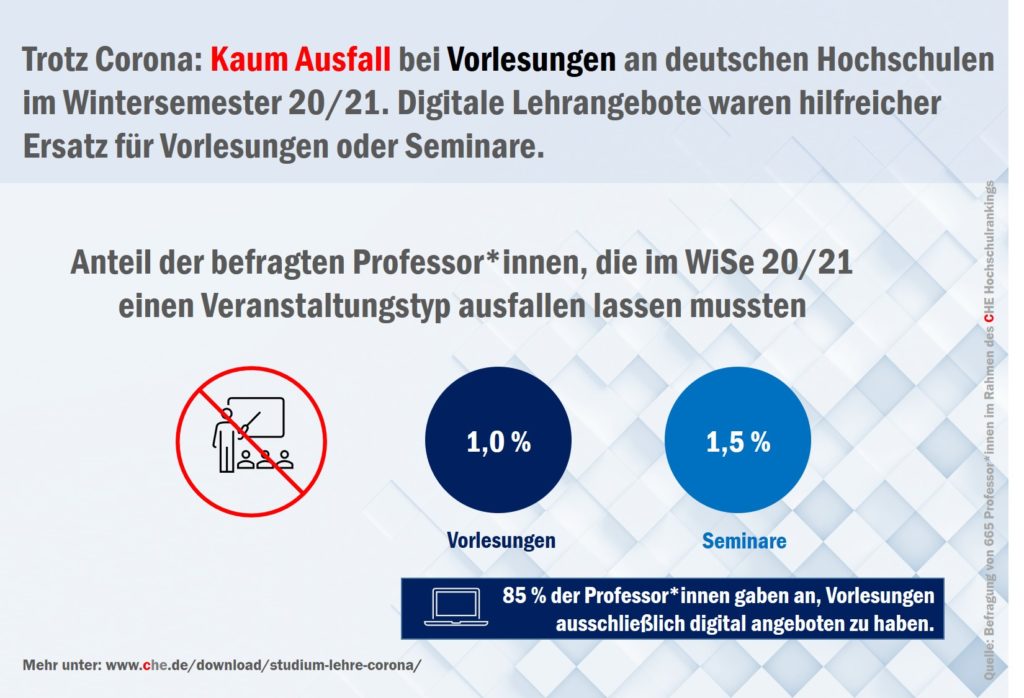 Studium während der Corona-Pandemie - Foto: Engin Akyurt/Pixabay
Studium während der Corona-Pandemie - Foto: Engin Akyurt/PixabayThe impact of the coronavirus pandemic also has an effect on day-to-day university life. Nonetheless, higher education institutions (HEIs) in Germany were able to continue delivering lectures and assessing students with little disruption. These are the findings of a current survey of more than 27,000 students and 665 professors conducted by the CHE Centre for Higher Education. For the future, both teaching staff and students would like to see a greater use of online teaching elements. Only one in five teaching staff members wish to return to purely classroom-based teaching.
The majority of scheduled courses at German HEIs were able to take place in winter semester 20/21 in spite of the coronavirus pandemic. This was because courses were switched to online teaching, either in part or in full, as shown by a recent study conducted by the CHE Centre for Higher Education.
Not even one per cent of the professors surveyed in the analysis stated that lectures had to be cancelled completely in the winter semester. In addition, almost all teaching staff members were able to offer seminars, exercise classes and tutorials as planned. This must not be taken for granted, as a glance at the situation abroad shows, where about a third of nursing students reported that the majority of their courses were cancelled during the Covid pandemic.

However, German HEIs also found it difficult to fully maintain the entire range of courses in subjects requiring face-to-face attendance. “It is easy, for example, to give a computer science lecture online in compliance with coronavirus regulations. But the current situation presented a quite different set of challenges for science subjects requiring lab work or field trips,” stated Marc Hüsch, author of the study. For instance, 43 per cent of the geography and geosciences professors surveyed were forced to cancel face-to-face courses such as field trips in the winter semester, with no possibility to offer alternative solutions.
Students across all subjects were satisfied with the general organisation of their studies, which enabled them to continue studying in spite of the pandemic. Three out of four students rated the possibility of continuing to be assessed or have credit transferred at their universities as good or very good.
“The continuation of teaching and assessment during the Coronavirus pandemic to date is a feat of strength on the part of Germany’s HEIs that cannot be praised highly enough,” summarised Frank Ziegele. The ability of students to make progress in their studies, even under extremely difficult conditions, is appreciated by them, as reflected in the good scores they gave to their universities. “The autonomy of higher education institutions is the determining key factor when it comes to crisis management. Unlike with schools, this autonomy enabled HEIs to develop their own individual, flexible solutions on the ground at short notice, and to remain responsive and effective during the coronavirus pandemic,” remarked the CHE Executive Director.
Another decisive factor was that HEIs had the technical means in place to switch to online teaching, in some cases from one day to the next.
For the long-term future of studying and teaching post-pandemic, many students and teaching staff would like to see the continued targeted integration of online teaching elements without, however, abandoning face-to-face formats altogether. Semi-online models such as blended learning or digitally enriched classroom teaching are considered by the professors surveyed to be learning settings of the future. Only one in five professors wish to return to purely classroom-based teaching after the pandemic.
However, both teaching staff and students currently see a need for action and support regarding the technical and didactic aspects of online teaching. “Teaching staff must not be left to cope as best they can again with the subject-specific advancement of online teaching and learning formats once normality returns post-Covid,” urged CHE study author Hüsch, calling for the continuous development of a good digital infrastructure and support structure on the basis of current experience.
About the study:
The analysis was based on assessments and evaluations of the situation caused by the coronavirus pandemic in winter semester 2020/21. To this end, more than 27,000 students of biology, chemistry, geography, geoscience, computer science, mathematics, medicine, nursing science, pharmacy, physics, political science / social sciences, sports sciences and dentistry from around 150 higher education institutions in Germany were surveyed as part of the CHE University Ranking. The responses of 665 professors from German universities in the areas of geography, geoscience, medicine, political science / social sciences and dentistry were also included in the analysis. It also contained the responses of 177 administrations of German HEIs. Answers provided by around 27,500 international students from 208 HEIs in 52 countries as part of the international university ranking U-Multirank were used as an international benchmark. Both surveys were conducted by means of online questionnaires between October 2020 and January 2021. The publication entitled “Studium und Lehre in Zeiten der Corona-Pandemie” (Studying and teaching in times of the coronavirus pandemic) was written by Sonja Berghoff, Nina Horstmann, Marc Hüsch and Kathrin Müller. Detailed results broken down by subject are published in CHECKs, which appeared simultaneously. These publications, containing detailed information provided by students and professors from 13 subjects ranging from biology to dentistry, are available for download. In addition, an interactive version of the data shown – also comparing subjects – is available at the following link.
